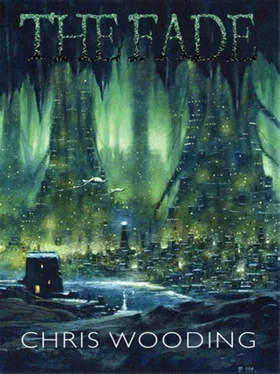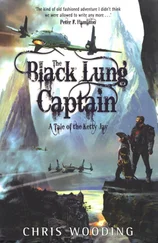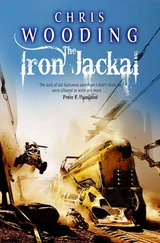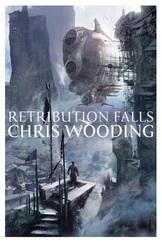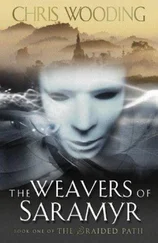Chris Wooding - The Fade
Здесь есть возможность читать онлайн «Chris Wooding - The Fade» весь текст электронной книги совершенно бесплатно (целиком полную версию без сокращений). В некоторых случаях можно слушать аудио, скачать через торрент в формате fb2 и присутствует краткое содержание. Жанр: Фэнтези, на английском языке. Описание произведения, (предисловие) а так же отзывы посетителей доступны на портале библиотеки ЛибКат.
- Название:The Fade
- Автор:
- Жанр:
- Год:неизвестен
- ISBN:нет данных
- Рейтинг книги:3 / 5. Голосов: 1
-
Избранное:Добавить в избранное
- Отзывы:
-
Ваша оценка:
- 60
- 1
- 2
- 3
- 4
- 5
The Fade: краткое содержание, описание и аннотация
Предлагаем к чтению аннотацию, описание, краткое содержание или предисловие (зависит от того, что написал сам автор книги «The Fade»). Если вы не нашли необходимую информацию о книге — напишите в комментариях, мы постараемся отыскать её.
The Fade — читать онлайн бесплатно полную книгу (весь текст) целиком
Ниже представлен текст книги, разбитый по страницам. Система сохранения места последней прочитанной страницы, позволяет с удобством читать онлайн бесплатно книгу «The Fade», без необходимости каждый раз заново искать на чём Вы остановились. Поставьте закладку, и сможете в любой момент перейти на страницу, на которой закончили чтение.
Интервал:
Закладка:
I remember the sound of their voices, laughing and shouting and joking. Sometimes talking to me in their own tongue. Jibing, insinuating. I hope I didn't reply. I don't think I did. Better if they don't know. Better if they think I can't speak their language.
There must have been a journey. I have a sense of time passing, a jumble of images. We went through caverns. Past crystalline outcrops and giant fungal blooms. The creaking of a cart beneath me… Yes, I remember… I was in a cage, on a cart. We travelled along roadways, the ground made even by chthonomancy, protruding rocks spread and flattened by Gurta Elders. I remember crossing a stone bridge over a chasm, the red glow and warmth of magma far beneath us. At one point we passed into a rockworm tunnel a hundred spans in diameter, streaked with phosphorescent algae still feeding on the residue of the ancient monsters millennia after they disappeared. I remember the sense of expansion, of coming out from the narrow, enclosing earth into that vast, cylindrical cavern, stretching away into darkness.
I remember them feeding me, and me eating, too drugged to realise they were drugging me. Splitroot or chamis oil, I bet, or some Gurta plant I've not heard of. Bastards.
I remember their faces crowding round me. Pale, slender, fine-boned, blue-eyed. Talking in that high, singing way of theirs. One of them had a dirty mask over the lower half of his face, and he was ministering to me. Examining me.
I don't remember anything else.
It's a prison. I understand that much, at least. A rough-hewn cave, irregular in shape so probably natural: Elders wouldn't make something this uneven. I count a dozen in here, though my vision hasn't quite recovered. They're pretty spread out, sleeping in corners or talking or just watching me. Some of them have little nests of blankets and rags that they're guarding warily.
It's hot. The heat comes from the walls. That means we're either very deep underground or we're near some geological kink like a lava channel or a steam fissure or something. Torchlight spills through a grille that's been fixed to the only obvious exit: a hole in the ceiling, twenty spans above me. Cross-hatched bars separate us from whatever is beyond.
I try to raise myself and suck my breath through my teeth as my back protests. Complaint noted. More gingerly, I lever myself into a less vulnerable position, and I wait to see if anyone else fancies trying anything. Nobody seems to want to. That's good.
My head is clearing fast as the drugs wear off. I should be applying my chua-kin meditation techniques to speed the process – in fact, had I been conscious before they drugged me I could have negated most of their effects that way – but I can't muster the willpower. Something's nagging at me, something I should know. I wouldn't be able to centre myself in such an unquiet state of mind.
Then it comes to me.
Rynn is dead.
And I cry my guts out. The time that follows is a blur. Sounds are dulled. My senses operate in a murky, smeared world of strangers and their strange activities. I feel like I'm dead. I wish I was.
They come with ladders, and one by one we climb from the pit. I climb, too. I don't have the strength to make decisions on my own.
The guards wear the same armour as the soldiers on the battlefield, moulded from hardened sap. It's a process we've never been able to figure out, but it provides an ultra-light and tough material, whitish with a faintly iridescent rainbow sheen, that fits tight to their narrow bodies. Slim carapaces to house their fragile flesh. Slender swords hang at their waists.
I climb the ladder and find myself herded onto the walkway at the point of a blade, to join the others from my cell. Outside the cell there is a cavern, sweltering and thick with shadow. The dark rock has folded into ledges and depressions, around which a complex and rickety wooden walkway has been built. Stairs lead down from a wide exit high on one wall. Heavy grilles of black iron mark the entrances to other prison chambers, some set into the floor like ours, others in the walls. I can see men there, fingers clenched around the bars, watching us hopelessly, their faces grimed.
I shamble like a sleepwalker. I speak to no one, and no one speaks to me, except when the Gurta guards bark their orders in broken Eskaran. There is a man with us, his throat bruised, staring at me sullenly. He is bulky with muscle and fat, his hair receding, two rings through his lower lip. Small eyes under a heavy brow, glaring.
They take us up the stairs and out of the cavern, into a series of wide stone corridors. Badly lit, weathered by time. I walk with my head down, barely noticing anything. We cross a room via a balconied passageway; beneath us, prisoners work mill-wheels to grind spores for bread.
Shortly afterward, we are brought to a halt by a large iron door. One of the Gurta unlocks it with a heavy key, and the door swings open. A blast of dry, scorching air billows from within, as from the belly of an oven, stirring my hair. Red light falls across us all.
We go inside. The forge is a world of noise and sweat and fire. A seething landscape of molten metal, of clanking chains and pulleys, of pounding, oppressive heat. Great metal jugs spit and steam as their contents are poured. Dirty, glowing liquid slithers down trenches, flickers of flame dancing between the black patches on the surface. Men with hoods of animal hide and goggled eyepieces, brawny arms dripping, rake through the vats for impurities and wrench on hissing iron valve-wheels.
They put me to work on a device whose purpose I don't exactly understand. Another prisoner stands opposite me on the other side of a stone trench, through which a foul-smelling mineral slop flows, thick bubbles swelling and bursting on its surface. There is a kind of double barrier set across the trench, two heavy screens of cross-hatched metal. Our job is to slide them back and forth alternately, one arm pumping forward while the other pulls back, like trying to saw a log in two places at the same time. It's repetitive and seemingly pointless, and my shoulders ache and my back burns, but I do it anyway because I don't have the will to resist.
After the first shift I can barely raise my arms. The next shift I work twice as hard. I need the pain. I want it. Punishment for being alive.
The boy I work with is of a race I've never seen before, but I've heard stories. He's one of the Far People, a SunChild. Skin blacker than oil, irises so dark that it seems his pupils are enormous. He's slender and small, his hair hanging in tangles across his forehead. Seventeen or eighteen, I'd guess. His ears still haven't wholly healed from being clipped. The SunChildren cut the backs of their ears into fin-shapes as a rite of passage.
Ordinarily, I'd have been fascinated by him. I'd have wanted to know all about him: how he came to be here, where he was from, what strange customs he held. I'd always been the curious sort; I suppose that was why I found Liss and Casta such good company when others found their endless gossip infuriating. But my curiosity has withered, like all my feelings, to a blackened stump.
For his part, he doesn't say a word. I catch him glancing at me once or twice, but his gaze is quickly averted. Perhaps I see pity there, perhaps fear, perhaps nothing at all. But I'm thankful, at least, that he doesn't trouble me.
Our lives are measured by the clanging of an enormous bell, somewhere far above us. Each bell marks off three hours. Unconsciously, I count the strikes and match them to the rhythm of work and rest. Even through the haze of grief, I can't help but try and put things into order.
Gurta use the same system of turns, segs, hours and minutes that we do. We adopted it from them, after all. They use different terms, but the divisions are the same: two hundred and seventy-two turns to the year, the time it takes the mother-planet to circle its sun; ten turns to the orbit, or the time it takes our little moon to circle the mother-planet; one full rotation of Callespa counts as a turn; a third of that is a segment, or ten hours; thirty hours to the turn; ninety minutes to the hour. Deep beneath the surface, time is governed by the tides, the tug of the looming mother-planet.
Читать дальшеИнтервал:
Закладка:
Похожие книги на «The Fade»
Представляем Вашему вниманию похожие книги на «The Fade» списком для выбора. Мы отобрали схожую по названию и смыслу литературу в надежде предоставить читателям больше вариантов отыскать новые, интересные, ещё непрочитанные произведения.
Обсуждение, отзывы о книге «The Fade» и просто собственные мнения читателей. Оставьте ваши комментарии, напишите, что Вы думаете о произведении, его смысле или главных героях. Укажите что конкретно понравилось, а что нет, и почему Вы так считаете.
